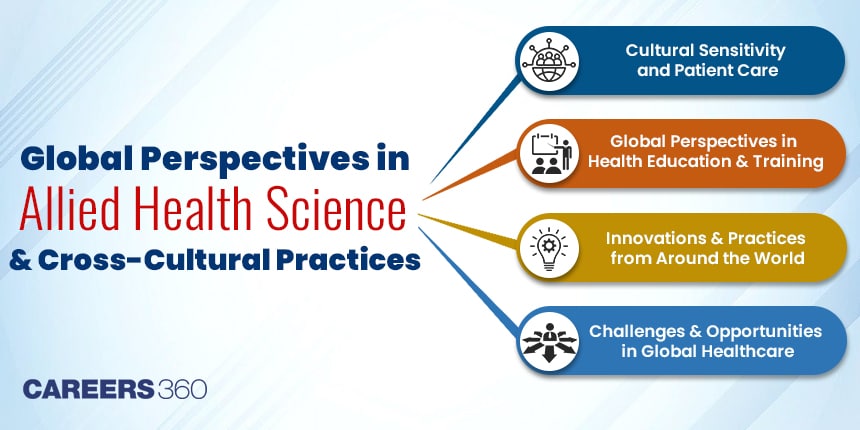Global Perspectives in Allied Health Science and Cross-Cultural Practices
Allied health professions include a wide range of specialities such as medical technology, occupational therapy, physiotherapy, and speech-language pathology. They are essential to healthcare worldwide, contributing to diagnosis, rehabilitation, and patient support. With growing global health needs, allied health professionals now play a central role in promoting accessible, quality healthcare services.

Advancements like artificial intelligence and digital health tools are reshaping allied healthcare. From AI-powered imaging to virtual rehabilitation platforms, technology is complementing traditional skills, ensuring more accurate diagnosis, personalised care, and better access to medical services across regions.
Global Perspectives in Allied Health Science and Cross-Cultural Practices
In today’s interconnected world, cultural sensitivity is important for allied health professionals. Diverse patient backgrounds influence healthcare delivery, from food habits to treatment preferences. Understanding these differences improves patient trust, compliance, and health outcomes. The following perspectives highlight how cultural awareness, education, and innovation shape allied healthcare across the globe.
Cultural Sensitivity and Patient Care
Cultural diversity directly affects treatment outcomes and patient satisfaction. Allied health professionals must not only respect cultural differences but also adapt methods to individual needs. Dietitians adjust dietary guidance to match food traditions, while physiotherapists consider cultural views on physical contact. Such sensitivity fosters trust, promotes compliance, and enhances recovery.
Training in cultural competence is increasingly emphasised in healthcare systems. Programmes focus on teaching communication skills, ethical practices, and cultural awareness. This prepares allied health professionals to deliver care that is respectful, inclusive, and patient-centred, ensuring effective treatment in multicultural societies worldwide.
Global Perspectives in Health Education and Training
Educational institutions are now combining global perspectives into their allied health curricula. Students gain exposure through international case studies, cultural competency workshops, overseas clinical placements, and virtual simulations. These experiences improve adaptability and prepare graduates for diverse healthcare settings. Telehealth and online exchanges further broaden opportunities for cross-border collaboration.
Partnerships between universities and organisations ensure global standards in training. Collaborative projects in curriculum design, faculty exchange, and joint research raise the quality of allied health education. This international cooperation encourages innovation and ensures future professionals are well prepared to respond to global health challenges.
Innovations and Best Practices from Around the World
Global innovations continue to transform allied health. Traditional methods, such as acupuncture and herbal medicine in Asia, are increasingly integrated into rehabilitation programmes, complementing modern evidence-based approaches. Patients benefit from broader treatment options that respect cultural values while maintaining medical effectiveness.
Technology also drives change across borders. Wearable health devices, robotic-assisted rehabilitation, and AI-enabled diagnostic tools improve accuracy and efficiency. International research collaborations allow allied health professionals to share best practices, blending cultural insights with modern innovation to enhance patient outcomes and healthcare delivery.
Challenges and Opportunities in Global Healthcare
Globalisation expands access to allied healthcare but highlights inequalities in resources and infrastructure. While developed nations advance with technology, developing regions face shortages in trained professionals and facilities. Telehealth and remote monitoring are increasingly used to reduce these gaps, offering wider access to healthcare services.
Cultural and language barriers remain significant challenges. Solutions include interpreters, cultural mediators, and specialised communication training. Equipping allied health professionals with both clinical and cultural skills ensures they can provide inclusive, patient-focused care in varied healthcare environments. This adaptability is essential for fair and effective global healthcare delivery.
Conclusion
Global perspectives in allied health stress the importance of cultural awareness, innovation, and collaboration. By combining traditional practices with modern technologies and by embracing cultural diversity, allied health professionals can deliver equitable, patient-centred care worldwide. Building inclusive healthcare systems remains key to advancing global standards and addressing future health challenges.